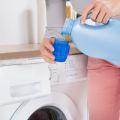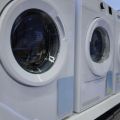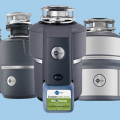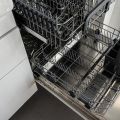12/17/2020
How to Use High-Efficiency Washers With High-Efficiency Detergent

7/8/2021
High-Efficiency Washers & Detergents
By Florida’s Leading Washer and Dryer Repair Service | Appliance Doctor
Looking for a high-quality and affordable washer in Florida? Call Appliance Doctor Inc., Florida’s leader in Appliance Repair at 239-936-0111.
High-Efficiency Washers
- High efficiency washers, or HE washers, have been the standard in Europe for many years.
- According to the U.S. Environmental Protection Agency, high-efficiency washers save 6,000 gallons of water per year for an average family.
- Offered in the United States for more than two decades, they have increased in popularity as consumers are drawn to their water and energy-saving capabilities.
HE Washer Operation
- High-efficiency washers, both front-loading, and top-loading use a tumbling system rather than an agitator to move clothes through the water.
- In front-loading models, the tub rotates clockwise and then counterclockwise to achieve the tumbling motion.
- Due to their design without a center agitator, high-efficiency washers are more gentle on clothes. The cleaning action is softer and prevents stretching and pulling that can distort clothes.
- Clothes may seem dryer when removed from a high-efficiency machine because more water is removed during a high-speed spin cycle. This reduction of water saves energy if clothes are dried in an automatic dryer.
High-Efficiency Detergents
- One of the most critical steps to successfully operating a high-efficiency washer is to use detergents specially formulated for these washers.
- High-efficiency detergents are formulated to be low-sudsing and quick-dispersing for use in low water volume machines.
- High-efficiency detergents hold soil in suspension, so it is not redeposited onto clean clothes.
- Using a traditional detergent will result in too many suds and prevent the tumbling action required for cleaning.
- Excessive suds can overflow the washer and cause permanent damage to electronic controls.
- Many users complain about musty odors and mildew growth in high-efficiency washers. Excessive detergent residue or fabric softener residue is the culprit. This residue, which also traps laundry soil, is the perfect energy source for mildew growth.
- Always look for the "He" symbol on detergent boxes or bottles. Some presoak products may still be normal to high-sudsing and their use should be limited in high-efficiency washers.
HE Detergent Usage
As with all detergents, take time to read the usage label and guidelines.
- More is not always better! For a normal size load of laundry, use only one to two teaspoons of high-performing high-efficiency detergent.
- If the high-efficiency detergent is not cleaning clothes, do not simply add more. Overdosing leads to additional problems including stiff and scratchy fabrics, trapping of odor bacteria, and streaks from the redepositing soil. Instead, switch to a better quality detergent.
- Most high-efficiency washers have automatic detergent dispensers. Read the washer's care and use guide to discover how to fill the dispensers.
- Most accept either powder or liquid detergents. Never mix the two - caking and clogging can occur.
High-Efficiency Washers & Detergents Facts
1. HE Washers Use Less to Do More.
- HE Washers use at least 50% less water than traditional washers, washing clothes in a shallow pool of water, then using high pressure sprays to rinse.
- Because they use less water, less energy is used to heat the water — just 20 to 50% of the energy used by traditional washers.
- Less water and energy = environmentally friendly and budget-friendly.
- HE Washers spin faster and remove increased water from clothes, so clothes require less time in the dryer.
- HE Washers produce less suds and keep clothes in constant motion so experts say clothes get even cleaner.
2. Do More Laundry at One Time.
- HE washers offer more capacity than traditional machines because they do not have a large agitator and they use less water.
- Washing more clothes at once means fewer loads!
3. But, HE Washers Have Longer Wash Cycles.
- Since HE Washers use less water, they require a longer wash and rinse cycles.
4. HE Washers are Gentler on Clothes.
- Top loaders use spinning, rotating plates or disks to wash laundry, providing a gentler way to clean clothes; many models recirculate water during the rinse cycles.
- Front-loaders tumble laundry through
thewater while the tub rotates, cleaning clothes efficiently and gently.
5. HE Washers Require HE Detergents.
Traditional detergents are formulated to work with more water and create excess suds in HE washers, which can:
Traditional detergents are formulated to work with more water and create excess suds in HE washers, which can:
- Interfere with how HE washers work and even void warranties
- Leave suds behind on clothes
- Leave sticky films of suds and soils in the washer that can cause mold and odor
6. HE Washers Require Regular Cleaning.
- Regularly run a maintenance cycle either as a setting on your machine or manually
- Promptly remove washed clothes after the wash cycle is finished
- Keep the door open, especially for front-loading washers, to allow any leftover water or moisture to evaporate
Florida’s Leader in Appliance Repair | Appliance Doctor Inc.
When your washer or dryer stops performing, call the doctor! We understand under-performing washer parts and dryer parts create significant inconvenience and stress. Our washer repair technicians diagnose any complications and resolve repairs with expertise.
No need to worry once you call Appliance Doctor Inc.! Our Appliance Repair team provides top-of-the-line service and prompt same-day repair work.
Additional Appliance Doctor Repair Services
Call Appliance Doctor Inc. today!
- Cape Coral: 239-540-9500
- Estero/Bonita Springs: 239-992-0505
- Fort Myers: 239-936-0111
- Naples: 239-434-7546
- East Naples: 239-732-0111
- Marco Island: 239-642-0505
For additional information, visit our website https://www.sickappliances.com/.
Other articles and publications:
There is no escaping dirty laundry, but a reliable washing and drying machine that gently cleans clothes for years to come eases your household chores.
These days, a modern kitchen is never complete without garbage disposal. Beneficially, it saves time, less waste, properly disposes of food wastage, and saves money on costly household repairs.
5/10/2021
Never buy a dishwasher without looking inside first. It can be easy to get caught up in brand names and high-tech features. Appliance Doctor Inc.
6/10/2021
Refrigeration trends for 2021 can be distinctly featured in terms of functionality and practicality, convenience and comfort, technological integration, and most importantly, smart intelligence.
1/7/2021
Modern day technologically advanced microwaves are changing how we cook and spend time in the kitchen. Learn from Appliance Doctor Inc about microwaves, the leading appliance doctor expert in Florida.
4/28/2021
Learn more about to care before & after an earthquake to your Appliances. Call Appliance Doctor a 239-434-7546 for appliances repair in Southwest Fl.
8/5/2021







